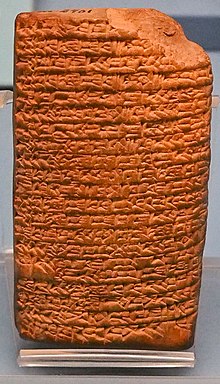Love poetry

As love poetry is referred to a special form of poetry and music (there rather love song called), where the love is sung between two people. A distinction can be made between several forms:
- as a poem or a song - this again in several forms,
- as a hymn to the loved one,
- about happiness and kissing , fulfillment or trust ,
- as thanks or prayer ,
- about the pain or despair of the rejected person,
- as a longing for death - z. B. in romance ,
- Reflect on the spectrum from joy to fear , agony and grief
- and other (rarer) forms.
Historical and regional overview
Love poetry has been handed down from the millennia before the turn of the times (e.g. from Sumer , in the Bible (e.g. Song of Songs ), in the Kama Sutra ) and found its first climax in antiquity ( e.g. with Ovid ). But also in the 12./13. In the 19th century, love songs reached another high point: Minstrels (from minne = love) were said to have a special skill in inventing and performing soulful songs. The art of minstrel was highly regarded among the young nobles: Among other things, there were also singing competitions among the best minstrels, in which they vied for the favor of the "noble Frouwen". Hartmann von Aue and Wolfram von Eschenbach were famous for their poetry; Walther von der Vogelweide was considered to be the one who invented the most beautiful melodies.
Love songs were known and loved across all social classes. These were disseminated orally; from the 15th century also recorded in handwritten song books. The Lochamer songbook , written in Nuremberg in 1450 , which also contains the song All my 'thoughts , is one of the oldest collections of songs.
In the further development of European literature, special stages of the love song should be mentioned: the minnesong, the baroque period , romanticism and the folk song . But there are also amazing texts in pop music , as the recapitulation of Austropop recently showed in summary.
Measure in love poetry
The meter used is very different, but every time has its fashions . So preferred z. B. the Second Silesian School (around 1650-1700) the iambus :
With what sweetness / o tender mouth
I kiss the ruby ground!
With what sweetness I hear the lips speak that are
full of honey words!
Oh but / if I take pleasure in
, I have to break free from the other.
Your heavenly spirit enlivens the words river of
the soul soul your kiss.
How should I escape the choice / difficult choice?
Oh / if only your noble mouth could
if so much favor Heaven has granted to
kiss with speeches / and speak with kisses!
( Hans Assmann von Abschatz, 1646–1699).
From the Romantic era, for example, the serenade set to music by Schubert should be mentioned, or the mourning of a loss:
I stood in dark dreams - and stared at her portrait,
and the beloved face / secretly began to live ...
The lyrics of many folk songs are often just as old . Two from the Bavarian-Upper Austrian language area are representative. Many go back to texts by earlier poets.
I (ch) liab di as hard - as the Bam its AEST ' -
wia of Him-mel his star - degree so i'm di liked.
Loving brings great joy.
All people know
that. A beautiful darling knows me
With two black-brown eyes
That for me, that for me,
That for my heart.
From the rich work of Goethe , a short hexameter stands out, which shows the border between love poetry and epigram :
I probably love boys too, but I prefer girls:
if I have had enough of them as a girl, she will still serve me as a boy.
See also
literature
- Gerlinde Haid : love song. In: Oesterreichisches Musiklexikon . Online edition, Vienna 2002 ff., ISBN 3-7001-3077-5 ; Print edition: Volume 3, Verlag der Österreichischen Akademie der Wissenschaften, Vienna 2004, ISBN 3-7001-3045-7 .
- Gerhard Härle: Poetry - Love - Passion . Stroll through love poetry from Sappho to Sarah Kirsch. Vandenhoeck & Ruprecht. Göttingen 2007, ISBN 978-3-525-20850-2 .
- Meinolf Schumacher : Love in Poetry between the Middle Ages and Early Modern Times. In: German lessons. 65 (1), 2013, pp. 2–11 ( digitized version ).
Love poetry collections
For many poets , individual collections of their love poems have been published. For example for Michelangelo Buonarotti , Bertolt Brecht Joachim Ringelnatz and Joseph von Eichendorff . There are also anthologies that cover the broad spectrum of love poetry.
Web links
- Nice anthology (not only) of German love poetry
Individual evidence
- ↑ Michelangelo Buonarotti: Love poems. Italian and German, selected by Boris von Brauchitsch . Insel Verlag, Frankfurt am Main / Leipzig 2007, ISBN 978-3-458-34944-0 .
- ↑ Bertolt Brecht: Poems about love. selected by Werner Hecht . Suhrkamp Verlag, Frankfurt am Main 1982, ISBN 3-518-02470-1 .
- ↑ How I look forward to you - love poems. 2nd edition, marixverlag, Wiesbaden 2015, ISBN 978-3-7374-0955-1
- ^ Joseph von Eichendorff: Love poems. edited by Wilfrid Lutz. Insel Verlag, Frankfurt am Main / Leipzig 2000, ISBN 3-458-34291-5 .
- ↑ Hans Wagener (Ed.): German love lyric. Philipp Reclam jun., Stuttgart 1982, ISBN 3-15-027759-0 .
- ↑ The most beautiful love poems , selected and provided with an afterword by Sigrid Damm . Insel Verlag, Frankfurt am Main / Leipzig 2009, ISBN 978-3-458-35169-6 .